France. Sowing Hope in the Suburbs of Marseille.
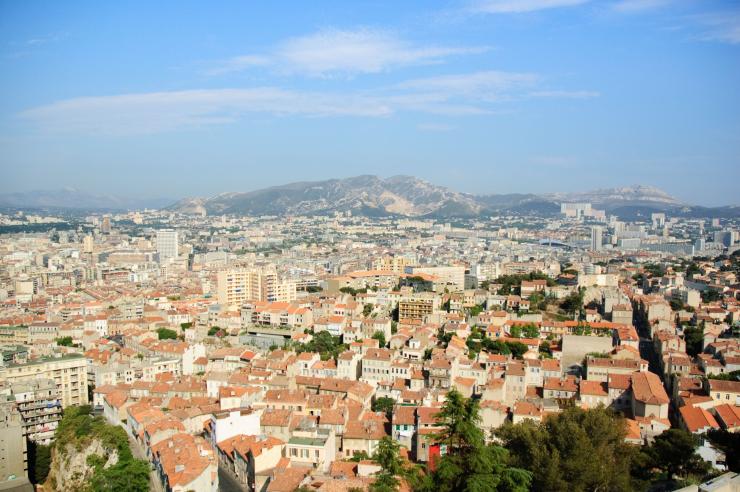
In the northern districts of Marseille, a drug trafficking stronghold, people grow up surrounded by marginalization and violence. Here, some Catholic groups have chosen to share life with the residents, almost all of whom are Muslim, to create a brotherhood
and promote development.
To access the city of Campagne-Lévêque, with its ochre public housing blocks, you have to pass an informal checkpoint manned by a boy with the hood of his sweatshirt pulled over his face. In the infamous northern neighbourhoods of Marseille, where since the beginning of the year there have already been around forty victims of score-settling between drug trafficking gangs, the State is struggling to gain a foothold.
And it is the choufs, at the lowest level of the drug dealing system, who control who passes through and act as lookouts in case of unexpected visits from the police.
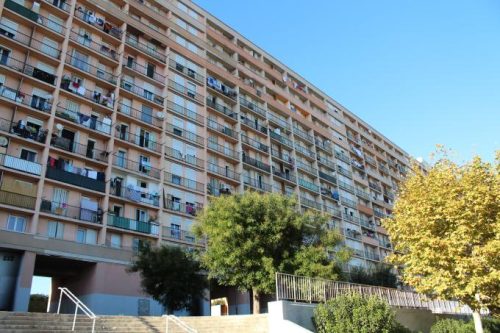
Located on the outskirts of Marseille in the Campagne-Lévêque suburb. Photo: Le Rocher
Mark, a 22-year-old engineering student, gets around with no problems: everyone here knows and respects Le Rocher, the Catholic association with which the young man is doing a period of civil service in this sort of ghetto, 95% inhabited by people of Maghrebi and African origin, in a situation of economic and social precariousness. Next to a dilapidated block of flats stands a deserted football pitch: “Mothers prefer not to let their children go down to play because they fear they will be involved in illegal activities…” Mark explains. However, when Le Rocher operators are there, the courtyard fills up with kids. “After fifteen years, families trust us”, says Arthur Belo, the leader, together with his wife Tiphaine, of the Marseille section of the association, created to offer educational and social interventions in the most difficult urban areas of France.
“They can have dreams”
Here in Campagne-Lévêque, the initiatives range from after-school activities for the little ones to weekly lunches with specialities cooked by the neighbourhood maman, from assistance with bureaucratic procedures to street cafés to create opportunities for conviviality with the residents. But there are also visits to the city – with kids who sometimes have never seen the old port of Marseille – and summer camps in the countryside for teenagers. All ways to open the horizons of young people accustomed to having fewer opportunities than their peers, in an area where unemployment reaches 50%.
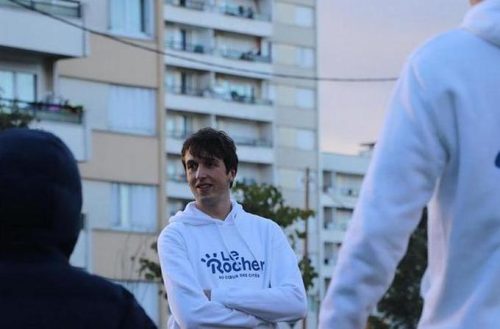
Le Rocher operator in conversation with people. Photo: Le Rocher
“We want to convince them that they too are worth it, that they can have dreams”. Arthur and Tiphaine arrived two years ago, with their newborn son in tow, following a choice made thanks to their faith: “We wanted to share the daily life of these families and create bonds of brotherhood. For us this is a mission”. The couple, who today are expecting another child, begin each day with prayer: “Together with the volunteers and collaborators who so desire, we have half an hour of adoration, we participate in the Mass celebrated by the priest of the nearby parish and then we continue with Lauds and songs. Only then do we begin our work”. And even if the residents are almost all Muslim, the common faith in God represents a factor of closeness and trust. It is no coincidence that, during Pope Francis’ recent visit to Marseille, Arthur and Tiphaine attended Mass at the Velodrome stadium together with their Muslim neighbours Arbana and Messahoud.
Missionary Frontier
For Sr. Francesca, Sr. Anna and Sr. Lara, the city of La Solidarité, in the 15th arrondissement of Marseille, is ‘a missionary frontier’. The three nuns live on the 17th floor of one of the colourful buildings in which 3,500 people live, who today greet them with a smile on the street.
The Sisters are members of the Disciples of the Gospel, a religious institute born in the diocese of Treviso (Italy) in the wake of the spirituality of Charles de Foucauld, and which for some years has opened a fraternity in this corner of Europe where they meet, not without difficulty, many portions of the world. “Marseille is a city made up of contrasts: it is welcoming, supportive, rich in different cultures.
but the poverty is palpable and integration is not always easy”,
Sr. Francesca explains.
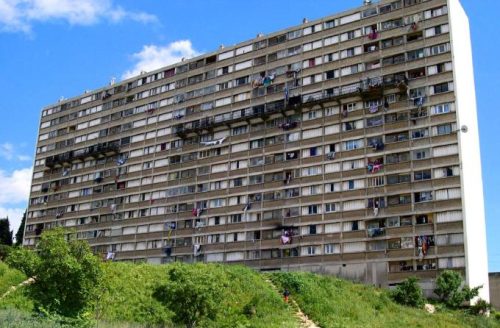
Park Kalliste in the northern suburbs of Marseille. Photo Ministère de la cultura
Amid these contradictions, she and her sisters chose to ‘offer a presence of prayer and fraternity, which seeks to create bridges through friendship’. Both in neighbourly relations and in the professional context: Sr. Lara, in addition to working for youth ministry, teaches in a Catholic school (where, however, the majority of students are of the Muslim faith) and is a member of the funeral service team of the diocese, while Sr. Anna is a chaplain at the nearby Hôpital Nord and in a psychiatric hospital. “In moments of particular pain and vulnerability, we try to reach people with a word of hope”, she says.
Sr. Francesca, on the other hand, accompanies the catechumens of the diocese: “Every year around a hundred Baptisms is administered to people from very different contexts and of all ages”, she testifies. In the neighbourhood, the nuns collaborate with the Missionaries of Africa, who manage the nearby parish complex of Saint Antoine – Notre Dame Limite. “For a few years, in a room in the parish on the ground floor of a public building, we held a sewing and crochet course for women, both Christian and Muslim: a place of friendship and sharing that we have called ‘Abraham’s Tent’. Weekly activities are also organized here for primary school children, which focus on manual skills and art ‘as tools for expressing themselves and enhancing their potential’”.
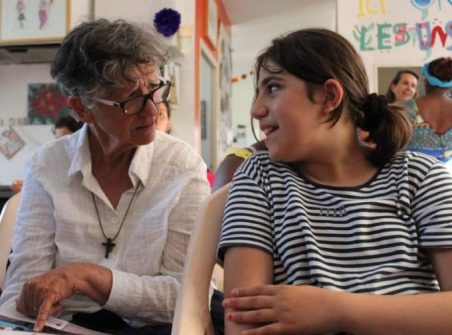
The presence of the Catholic Sisters is “To offer a presence of prayer and fraternity, which seeks to create bridges through friendship”. Photo: Le Rocher
This is the same idea from which the Arts and Development Association was born, which brings established artists to the suburbs to organize painting workshops and expressive activities, from dance to music. “Beauty attracts young people and allows them to channel their energies into activities that bring joy”, explains Patrice Boulan, president of this branch of ATD Quart Monde, an organization founded in the 1950s by the priest Joseph Wresinski in the slums outside Paris. “When we set up small exhibitions with their children’s works among the dilapidated barracks, even the parents of the neighbourhood come to see, full of curiosity – says Boulan – It is a way to reclaim spaces often perceived as ‘off limits’ because they are a fiefdom of criminals”.
Cultivating humanity and sowing hope where violence and marginalisation prevail: a challenge in which much of the future of our Europe is at stake. (Open Photo: The view of Marseille. 123rf)
Chiara Zappa/MM



